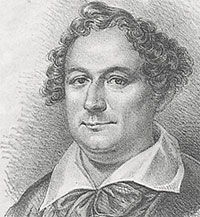Ulrik Torsslow
This article needs additional citations for verification. (November 2009) |

Lithography 1847.
Olof Ulrik Torsslow (18 December 1801 in Stockholm – 1 September 1881 in Stockholm), was a Swedish actor and theatre director. He is considered one of the most notable actors in his country's history.[by whom?] He is known as the leader of the great theatre strikes called "De Torsslowska grälen" (The Torsslow arguments) in 1828 and 1834, and for breaking the monopoly of the royal theatres in Stockholm in 1842.
Biography
Torsslow was born to bank official Mattias Torsslow. He was a student at Dramatens elevskola in 1816–19 and debuted as Hamlet on the Royal Dramatic Theatre in 1819, where he stayed until the great strike of 1834. In 1835–37 he was director for Djurgårdsteatern, where he broke the royal theatre's monopoly in 1842 (until 1837 in companionship with Pierre Deland). From 1835–1839 he toured with his own troupe, and from 1843–1856 he was employed at the theatre Mindre Teatern in Stockholm, where he was director from 1846 to 1850 (solo from 1850 onwards). He returned to the Royal Dramatic Theatre in 1856 and made his last performance in 1863. In 1830 he married to the actress Sara Torsslow.
References
- Georg Nordensvan, "Svensk teater och svenska skådespelare, Första bandet; 1773-1842".
![]() This article contains content from the Owl Edition of Nordisk familjebok, a Swedish encyclopedia published between 1904 and 1926, now in the public domain. [1]
This article contains content from the Owl Edition of Nordisk familjebok, a Swedish encyclopedia published between 1904 and 1926, now in the public domain. [1]
